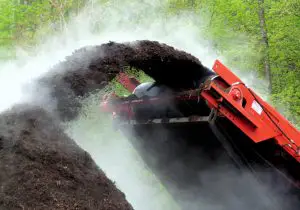Have you ever wondered why mulch steams? It’s a fascinating phenomenon that has puzzled gardeners and landscapers for generations. Mulch is an essential part of any garden or landscaping project, and understanding why it steams can help you make the most of it.
In this blog, we’ll explore the science behind why mulch steams, and how you can use this knowledge to better manage your landscape. We’ll look at the properties of mulch that cause it to steam, and also how you can use mulch to create a healthier, more vibrant garden. So, if you’re curious about why mulch steams and how you can use it to your advantage, read on!
Why Does Mulch Steam?
Mulch steams due to the process of evaporation. As mulch decomposes, it releases moisture which is then converted to steam. This process is accelerated by the sun’s heat, which causes the mulch to heat up and release even more moisture. You can use this knowledge to better manage your landscape by controlling the amount of mulch you use and the placement of the mulch.
For example, you can ensure that mulch is placed in areas that receive more sun and less shade, which will help to keep the mulch dry and reduce the amount of steam produced. Additionally, you can use mulch to create a healthier, more vibrant garden by controlling the amount of moisture in the soil and providing nutrients to the plants.
Causes of Mulch Steaming
A. Trapping Moisture and Heat
When mulch is laid down, it traps moisture and heat, creating a warm and moist environment for the mulch to decompose. As the mulch decomposes, it releases heat, which can cause the mulch to steam. This is especially true in areas that have a lot of humidity, as the moisture in the air will be trapped by the mulch and help to create a warm and moist environment.
B. Decomposition of Mulch
 Decomposition of the mulch itself is another cause of mulch steaming. As the mulch breaks down, it releases heat, which can cause the mulch to steam. This is especially true in areas that have a high amount of organic matter in the mulch, as the decomposition process will be faster and will create more heat.
Decomposition of the mulch itself is another cause of mulch steaming. As the mulch breaks down, it releases heat, which can cause the mulch to steam. This is especially true in areas that have a high amount of organic matter in the mulch, as the decomposition process will be faster and will create more heat.
The amount of heat that is released from the decomposition of the mulch can also be affected by the type of mulch that is used. For example, organic mulches, such as bark or wood chips, will decompose faster than inorganic mulches, such as gravel or stones. This means that organic mulches will release more heat and create more steam.
Benefits of Mulch Steaming
A. Improving Soil Quality
Mulch steaming has many benefits for improving soil quality and controlling weeds. For one thing, it helps to break down organic matter in the soil, making it more fertile and better able to support plant growth. The steam also helps kill off weed seeds, preventing them from sprouting. This can help gardeners keep their gardens weed-free and make maintaining a healthy, productive garden easier.
B. Controlling Weeds
Finally, the heat from the steam can help to break down existing weeds, making them easier to remove. All in all, mulch steaming effectively improves soil quality and controls weeds, making it a valuable tool for gardeners.
Reducing Mulch Steaming
A. Choosing the Right Mulch
Choosing the right mulch is essential for reducing steaming. Wood chips, straw, and bark are all popular options, but they all have different properties that can affect the amount of steaming. For example, wood chips can be more effective at retaining moisture and preventing weeds, while straw is better at preventing erosion. It’s important to consider the climate and soil conditions when selecting the right mulch for your garden.
B. Applying Properly
Applying mulch properly is also key for reducing steaming. It should be applied in a thin layer, about two to four inches deep, and kept away from the base of plants. Mulch should be kept moist, but not soggy, and should be checked regularly for signs of compaction or mold. Additionally, it’s important to use organic mulches, as inorganic mulches can increase the amount of steaming.
FAQ
Is the Steam from Mulch Dangerous?
No, the steam you see rising from mulch is not dangerous. It’s a normal part of the decomposition process where microorganisms break down the organic material in the mulch. The heat generated from this process can cause water to evaporate, creating steam. This is generally a sign of a healthy composting process and poses no risk to humans or pets.
Can Steaming Mulch Catch Fire?
While steaming mulch is not a direct fire hazard, if the internal temperature of a large pile of mulch gets too high, it can potentially ignite. This is more common in commercial mulch piles which are large and compact. For residential use, it’s recommended to turn your mulch pile regularly to allow heat to escape and prevent it from reaching combustible levels.
What Should I Do if My Mulch Is Steaming?
If your mulch is steaming, it’s generally not a cause for concern as it’s a sign of active decomposition. However, if you find the temperature is too high, or if the mulch has an unpleasant odor, you might need to turn the mulch to help it cool down and speed up the decomposition process. If the mulch is too wet, adding dry material can help balance the moisture level.
Conclusion:
Mulch steaming is a fascinating phenomenon that can be used to manage your landscape better. Mulch releases moisture, which is converted to steam when heated by the sun’s heat. By controlling the mulch you use and the placement of the mulch, you can ensure that mulch is placed in areas that receive more sun and less shade, which will help keep the mulch dry and reduce the amount of steam produced.
Additionally, mulch can create a healthier, more vibrant garden by controlling the moisture in the soil and providing nutrients to the plants. Knowing why mulch steams and how to use it to your advantage is an essential part of gardening and landscaping. With this knowledge, you can create a beautiful and successful garden that will last for years to come.